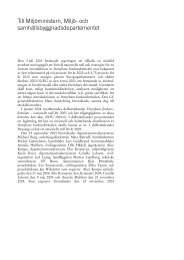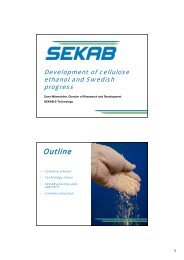Sugarcane ethanol: Contributions to climate change - BAFF
Sugarcane ethanol: Contributions to climate change - BAFF
Sugarcane ethanol: Contributions to climate change - BAFF
You also want an ePaper? Increase the reach of your titles
YUMPU automatically turns print PDFs into web optimized ePapers that Google loves.
Impacts of sugarcane bio<strong>ethanol</strong> <strong>to</strong>wards the Millennium Development Goals<br />
there is no displacement of food crops (Ra� Khan et al., 2007). In addition, in many African<br />
countries, cassava and maize are grown for subsistence purposes while cane is o�en grown<br />
for sugar export. Diversion <strong>to</strong> fuel production is therefore more likely <strong>to</strong> adversely a�ect<br />
food availability in the case of cassava (Johnson and Rosillo-Calle, 2007)<br />
At the international level, the growing international demand for biofuels is expected <strong>to</strong><br />
reverse the long-term downward trend in global prices of agricultural commodities. Several<br />
studies have been conducted linking increased global biofuels production with rising<br />
agricultural commodity prices. Estimations vary widely with most credible ones going<br />
up <strong>to</strong> 30 percent. Other contributing fac<strong>to</strong>rs <strong>to</strong> price increases are the weather-related<br />
shortfalls in many key producing countries, reduced global s<strong>to</strong>cks, increased demand from<br />
new emerging economies in Asia (OECD-FAO, 2007) and speculation (IFPRI, 2008). In<br />
that sense, the higher demand for biofuel feeds<strong>to</strong>cks is viewed as increasing pressure on an<br />
already tight supply.<br />
However, it is one issue trying <strong>to</strong> isolate how much biofuels, in overall, are responsible<br />
for the sec<strong>to</strong>r’s in�ationary pressure and, a di�erent one, understanding <strong>to</strong> what extent<br />
sugarcane bio<strong>ethanol</strong> is responsible for the price increase. Although the available evidence<br />
in this sense is also scant, it would suggest that, compared <strong>to</strong> other feeds<strong>to</strong>cks, sugarcane<br />
bio<strong>ethanol</strong> would have a slighter impact on food security. A key reason behind this is that<br />
sugarcane is not a principal food crop. Staple grains like maize and rice are o�en the main<br />
food source for the poorest people, accounting for 63 percent of the calories consumed in<br />
low-income Asian countries, nearly 50 percent in Sub-Saharan Africa, and 43 percent in<br />
lower-income Latin American countries (IFPRI, 2008). Rosegrant (2008) in an exercise in<br />
which biofuel production was frozen at 2007 levels for all countries and for all crops used<br />
as feeds<strong>to</strong>cks, shows the smaller price reductions for sugarcane followed by wheat while the<br />
higher reductions are for maize (Figure 1). Another reason been argued is that sugarcane<br />
price would be relatively uncorrelated with other food crops (Oxfam, 2008).<br />
3.1.2. Impacts on accessibility<br />
�e issue of how the gains and costs of biofuels <strong>to</strong> food security are distributed across society<br />
has been less explored in the literature. FAO and other commenta<strong>to</strong>rs agree that hunger<br />
is largely a matter of access rather than supply, so that a focus on rural development and<br />
livelihoods makes more sense that trying <strong>to</strong> maximise global food supply, which for now<br />
at least is adequate for global needs (Murphy, 2007).<br />
Higher agricultural commodity prices are good news for agricultural producers, but they<br />
have an adverse impact on poorer consumers, who spends a much larger share of their<br />
income on food (IFPRI, 2008). �ere are also di�erences depending on whether households<br />
are net food producers or buyers. For small farmers that are net food producers, overall<br />
gains in welfare and food security are expected due <strong>to</strong> rising revenues from biofuel crops and<br />
<strong>Sugarcane</strong> <strong>ethanol</strong> 209












